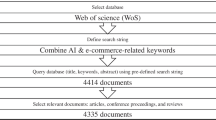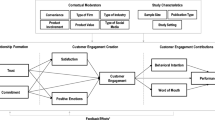Abstract
Recommender systems utilize social relationships to improve recommendation performance. This study explores social characteristics and how they affect recommendation performance. We define social characteristics as network embeddedness and preference heterogeneity. Taking rating characteristics as control variables, we build a regression model to explore the impact of two social characteristics on user-level predictive accuracy and the moderating effect of preference heterogeneity on the relationship between network embeddedness and user-level predictive accuracy. The results suggest that network embeddedness positively influences predictive accuracy, whereas preference heterogeneity negatively influences it. Our research reveals that as the preference heterogeneity increases, the positive effect of network embeddedness on predictive accuracy weakens. Preference heterogeneity has a greater impact on user-level predictive accuracy than network embeddedness. Our findings provide management implications for recommender system designers, which is of great significance for improving the accuracy of user-level prediction and reducing user complaints.





Similar content being viewed by others
References
Hu, Y., Y. Koren, and C. Volinsky. Collaborative filtering for implicit feedback datasets. in 2008 Eighth IEEE International Conference on Data Mining. 2008. Ieee.
Ma, H., I. King, and M.R. Lyu. Learning to recommend with social trust ensemble. in Proceedings of the 32nd international ACM SIGIR conference on Research and development in information retrieval. 2009.
Guo, G., Zhang, J., & Yorke-Smith, N. (2016). A novel recommendation model regularized with user trust and item ratings. IEEE transactions on knowledge and data engineering, 28(7), 1607–1620.
Camacho, L. A. G., & Alves-Souza, S. N. (2018). Social network data to alleviate cold-start in recommender system: A systematic review. Information Processing & Management, 54(4), 529–544.
Yang, B., et al. (2016). Social collaborative filtering by trust. IEEE transactions on pattern analysis and machine intelligence, 39(8), 1633–1647.
Yan, S., et al. (2017). An approach for building efficient and accurate social recommender systems using individual relationship networks. IEEE transactions on knowledge and data engineering, 29(10), 2086–2099.
Xu, C. (2018). A novel recommendation method based on social network using matrix factorization technique. Information processing & management, 54(3), 463–474.
Tang, J., Hu, X., & Liu, H. (2013). Social recommendation: A review. Social Network Analysis and Mining, 3(4), 1113–1133.
McPherson, M., Smith-Lovin, L., & Cook, J. M. (2001). Birds of a feather: Homophily in social networks. Annual review of sociology, 27(1), 415–444.
Marsden, P. V., & Friedkin, N. E. (1993). Network studies of social influence. Sociological Methods & Research, 22(1), 127–151.
Lewis, K., Gonzalez, M., & Kaufman, J. (2012). Social selection and peer influence in an online social network. Proceedings of the National Academy of Sciences, 109(1), 68–72.
Ma, H., et al. Sorec: social recommendation using probabilistic matrix factorization. in Proceedings of the 17th ACM conference on Information and knowledge management. 2008.
Jamali, M. and M. Ester. A matrix factorization technique with trust propagation for recommendation in social networks. in Proceedings of the fourth ACM conference on Recommender systems. 2010.
Guo, G., J. Zhang, and N. Yorke-Smith. Trustsvd: Collaborative filtering with both the explicit and implicit influence of user trust and of item ratings. in Proceedings of the AAAI Conference on Artificial Intelligence. 2015.
Ma, H., et al. Recommender systems with social regularization. in Proceedings of the fourth ACM international conference on Web search and data mining. 2011.
Cheng, X., Zhang, J., & Yan, L. (2020). Understanding the impact of individual users’ rating characteristics on the predictive accuracy of recommender systems. INFORMS Journal on Computing, 32(2), 303–320.
Pu, P., Chen, L., & Hu, R. (2012). Evaluating recommender systems from the user’s perspective: Survey of the state of the art. User Modeling and User-Adapted Interaction, 22(4–5), 317–355.
Koren, Y., Bell, R., & Volinsky, C. (2009). Matrix factorization techniques for recommender systems. Computer, 42(8), 30–37.
Lee, C., et al. (2015). A network structural approach to the link prediction problem. INFORMS Journal on Computing, 27(2), 249–267.
Grewal, R., Lilien, G. L., & Mallapragada, G. (2006). Location, location, location: How network embeddedness affects project success in open source systems. Management science, 52(7), 1043–1056.
Ma, L., Krishnan, R., & Montgomery, A. L. (2015). Latent homophily or social influence? An empirical analysis of purchase within a social network. Management Science, 61(2), 454–473.
Ahmadian, S., Meghdadi, M., & Afsharchi, M. (2018). A social recommendation method based on an adaptive neighbor selection mechanism. Information Processing & Management, 54(4), 707–725.
Ramos, G., Boratto, L., & Caleiro, C. (2020). On the negative impact of social influence in recommender systems: A study of bribery in collaborative hybrid algorithms. Information Processing & Management, 57(2), 102058.
Kluver, D. and J.A. Konstan. Evaluating recommender behavior for new users. in Proceedings of the 8th ACM Conference on Recommender Systems. 2014.
Adomavicius, G., & Zhang, J. (2012). Impact of data characteristics on recommender systems performance. ACM Transactions on Management Information Systems (TMIS), 3(1), 1–17.
Jannach, D., Zanker, M., & Fuchs, M. (2014). Leveraging multi-criteria customer feedback for satisfaction analysis and improved recommendations. Information Technology & Tourism, 14(2), 119–149.
Cunha, T., Soares, C., & de Carvalho, A. C. (2018). Metalearning and Recommender Systems: A literature review and empirical study on the algorithm selection problem for Collaborative Filtering. Information Sciences, 423, 128–144.
Currarini, S., Jackson, M. O., & Pin, P. (2010). Identifying the roles of race-based choice and chance in high school friendship network formation. Proceedings of the National Academy of Sciences, 107(11), 4857–4861.
Li, X., Sun, C., & Zia, M. A. (2020). Social influence based community detection in event-based social networks. Information Processing & Management, 57(6), 102353.
Dotson, M. R., Büschken, J., & Allenby, G. M. (2020). Explaining preference heterogeneity with mixed membership modeling. Marketing Science, 39(2), 407–426.
Horsky, D., Misra, S., & Nelson, P. (2006). Observed and unobserved preference heterogeneity in brand-choice models. Marketing Science, 25(4), 322–335.
Yan, L., Peng, J., & Tan, Y. (2015). Network dynamics: How can we find patients like us? Information Systems Research, 26(3), 496–512.
Wasserman, S., & Faust, K. (1994). Social network analysis: Methods and applications. Cambridge University Press.
Funk, S., Netflix update: Try this at home. 2006.
Shani, G., & Gunawardana, A. (2011). Evaluating recommendation systems. Recommender systems handbook (pp. 257–297). Springer.
Herlocker, J. L., et al. (2004). Evaluating collaborative filtering recommender systems. ACM Transactions on Information Systems (TOIS), 22(1), 5–53.
Guo, G., et al. LibRec: A Java Library for Recommender Systems. in UMAP Workshops. 2015.
Acknowledgements
This work is supported by the Major Program of the National Natural Science Foundation of China (91846201), the National Natural Science Foundation of China (72071069), the National Key Research and Development Program of China (2018YFB1402604). The authors warmly thank all of the anonymous reviewers for their time and efforts.
Author information
Authors and Affiliations
Corresponding author
Additional information
Publisher's Note
Springer Nature remains neutral with regard to jurisdictional claims in published maps and institutional affiliations.
Rights and permissions
About this article
Cite this article
He, F., Sun, C. & Liu, Y. What social characteristics enhance recommender systems? The effects of network embeddedness and preference heterogeneity. Electron Commer Res 23, 1807–1827 (2023). https://doi.org/10.1007/s10660-021-09517-5
Accepted:
Published:
Issue Date:
DOI: https://doi.org/10.1007/s10660-021-09517-5




